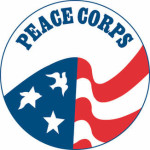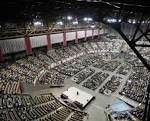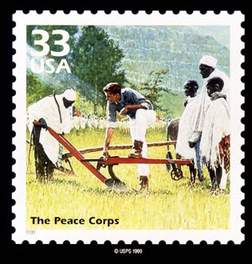Naming the Peace Corps

THOSE OF US WHO follow the history of the Peace Corps agency know the term “peace corps” came to public attention during the 1960 presidential election. In one of JFK’s last major speeches before the November election he called for the creation of a “Peace Corps” to send volunteers to work at the grass roots level in the developing world.
However, the question remains: who said (or wrote) “peace corps” for the very first time? Was it Kennedy? Was it his famous speech writer Ted Sorensen? Or Sarge himself? But – as in most situations – the famous term came about because of some young kid, usually a writer, working quietly away in some back office that dreams up the language. In this case the kid was a graduate student between degrees who was working for the late senator Hubert Horatio Humphrey.
Today, fifty-four years after the establishment of the agency in March of 1961, it is generally acknowledged that the late Peter Grothe, former Director of  International Student Programs at the Monterey Institute of International Studies, authored the term in the spring of 1960. I learned about the history of the naming from Peter when we exchanged a series of emails in the spring of 2006.
International Student Programs at the Monterey Institute of International Studies, authored the term in the spring of 1960. I learned about the history of the naming from Peter when we exchanged a series of emails in the spring of 2006.
“There would have been no Peace Corps without John F. Kennedy being elected President,” Peter told me on April 19, 2006. The term “peace corps” came about when Peter, then Senator Humphrey’s Foreign Relations Adviser, drafted a bill in May of 1960 and used the words “peace corps.” This was on the eve of the U-2 incident and the West Virginia primary which Kennedy won, a victory that showed a Catholic could win in a traditional protestant state, and, therefore, could win a general election.
“I gave the name “Peace Corps,” [in this draft of a Humphrey sponsored foreign assistance bill] in order to be consistent with the Senator’s Peace theme,” Peter explained. [Humphrey was also proposing an “education for peace” bill]. “I first, toying round, gave it the name “Works for Peace Corps,” but that seemed too cumbersome,” Peter remembers, “so I just shortened it to “Peace Corps” and Senator Humphrey approved. Some said that it sounded ‘communistic.’ Other said that it sounded too militaristic (corps). But somehow it stuck!”
Peter also added this important – and missing – piece of information about his involvement with the “peace corps” idea. “When I left Humphrey to go back to do my Ph.D. work, I asked him if I could take the idea to Kennedy, who, by that time, had won the Democratic nomination. Humphrey said, ‘of course!’ I drafted a speech I hoped JFK would use in the campaign and took it to the head of Kennedy’s speech writers in the campaign, Archibald Cox.
“I told Cox we had received an enormous amount of mail, many of it from organized letter writing by Protestant groups, because the Peace Corps reminded them of action-oriented, Protestant missionary work. Cox listened to this because, as you know, no Catholic had ever been elected to the presidency.
“I returned to Stanford and was in the Cow Palace in San Francisco the night Kennedy chose to give the Peace Corps speech I had written. There were some  changes, but about 75% of his speech was what I had written. The major change was that the Humphrey bill had the Peace Corps as an alternative to the draft, and Kennedy removed that provision (good politics!). I sat there in disbelief of Kennedy’s giving MY speech and I said to myself, “if the Lord wants to take me right now, Lord, I am ready to go.”
changes, but about 75% of his speech was what I had written. The major change was that the Humphrey bill had the Peace Corps as an alternative to the draft, and Kennedy removed that provision (good politics!). I sat there in disbelief of Kennedy’s giving MY speech and I said to myself, “if the Lord wants to take me right now, Lord, I am ready to go.”
Well, the Lord didn’t take Peter Grothe that night, or for many nights after that. And forever his name will be a footnote in the history of the agency, and a valued one at that.
Thank you, Peter, for giving us a name that, as you say, has stuck.

Where is his draft of this important speech? It should be on display or something? I know, in a Peace Corps library. Where do I get these great ideas?
As faith would have it, my brother Ron (Peru 1963-65) and I were tuned to the Armed Forces network in our big Buick traveling in Italy. Our father was a career Army officer stationed in Germany. Our mother, a staunch Republican was also listening to JFK give his speech at the Cow Palace…I can still hear his words. Awesome, JFK was talking to the youth of America, he was reaching out to Ron, me, and even our younger brother Junior. My mother made two statements…”I am voting Democrat this year!” And…”Bobby and Ronnie are going to this Peace thing after the election!”
That speech changed my life, where would I be had there never been a Peace Corps…where would any of us be had JFK not been elected?
Newbies…pay attention, you are part of history. Do your homework!
Bob, Colombia 1964-1966
Here is what I remember Sargent Shriver telling us during the 25th Anniversary celebration in DC:
He and others were criticized because every name they came up with was felt to be too militaristic to half the people and to the other half it sounded like a bunch of beatniks. So they decided to combine the word Peace to please the beatniks, and the word Corps to please the militarists.
I think Sarge’s most wonderful second-in-command, Bill Moyers, who had a topnotch imagination, maybe made that story up.
Ron Arias’ story is to me actually thrilling. The stories of both he and his brother are ‘enshrined’ in my memory for a long time now, and Ron’s literary eminence and career as a journalist are legendary.
I have told my story before about 1960 as an intern at WGBH-TV
meeting JFK twice, once seeking the Democratic Party nomination and the second time AS the nominee, both when he was the guest on Louis Lyons’ (Nieman Journalism Foundation Curator, Harvard) news program on which I was the assistant. On one, I think the first, Lyons spoke about Hubert Humphreys’ idea (of what would be called the Peace Corps, then unnamed as something similar to the American Friends Service Committe program abroad). The then Senator John Kennedy replied in his best almost happpy/ smart manner that it was a good idea (saying good ideas from another candidate were GOOD ideas) and that “When I am president, I will start such a program” (or words pretty close to that, and ending with his handsome head cocked to the side and smiling — you know like the cat that ate the cream). I was 23 then and it thrilled me, not just the idea for beginning such an orginization but as much for the joyful intelligence and daring-do in a politician.
P.S. As a Peace Corps Volunteer HEADING to Ghana in late August 1961 in the White House, I met PRESIDENT Kennedy both in the Rose Garden and in the Oval Office along with the other volunteers from 3 groups (Columbia, Tanganyika, Ghana).
Marian Haley Beil told me about that legendary interview with Louis Lyons. Harvard did not have copy of the interview, as I recall.
I wonder if the Nieman/ Harvard has looked into WGBH-TV archives. It was then in 1960 part of NET (NEW ENGLAND EDUCATIONAL TELEVISION) that preceded PBS.
I remember checking with the Nieman/library. I don’t remember what if anything else was suggested. I will try and follow up. Thank you.
Many thanks, Joanne Roll.
What about the WGBH-TV archives? How could the recordings, tapes, films of that critical period leading up to the nomination and later election of John F. Kennedy have been discarded? The Louis Lyons (I recall them as thrice weekly, 14 minutes and 28 seconds each on both New England news, national and international news, and interviews with major political figures) have been discarded? I’ll bet they at WGBH CHANNEL 2kept at least some of the theater interviews on the odd number days, Tues and Thurs (such as Norton Elliot’s stunning one with Ginger Rodgers).
I saw the above with a sadness that if it is true all that was lost, thrown-away, destroyed then history (a structured series of refined filtering systems has been lost in these combines of core samples of an era). Other than personal diaries and memories, what is left?
Anecdotes, maybe — with some spoonfuls of wee bits of obloieux.
Ever wonder what happens to the world, and how reduced, when we die? We have been trapped in the melting pot beyond the source with the muddy horizon and the pong festering. From root, route and range to a narrowing song.
“Still and all”: a phrase we use can mean “now and then” and even suggests “again”. Further, can we remember “absent meaning” without even the evidence that supports what meaning survives.
Before we say goodbye to our caves, need we recover the past.?